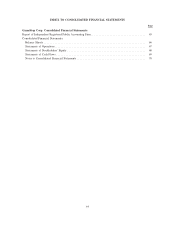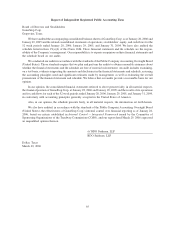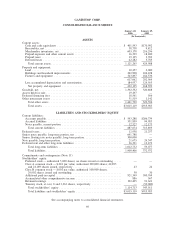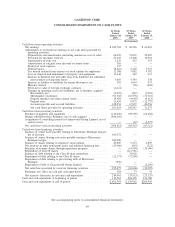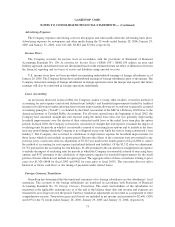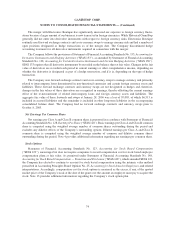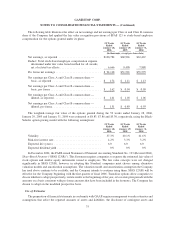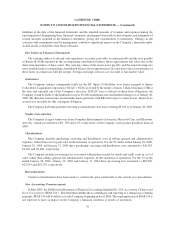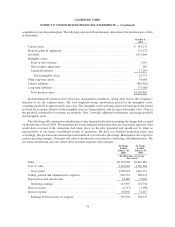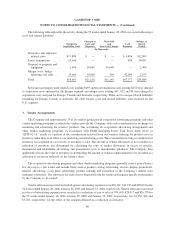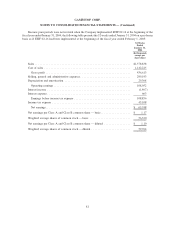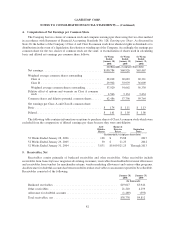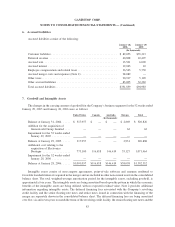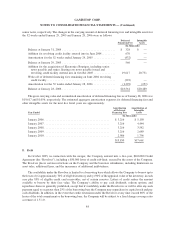GameStop 2005 Annual Report Download - page 83
Download and view the complete annual report
Please find page 83 of the 2005 GameStop annual report below. You can navigate through the pages in the report by either clicking on the pages listed below, or by using the keyword search tool below to find specific information within the annual report.The merger with Electronics Boutique has significantly increased our exposure to foreign currency fluctu-
ations because a larger amount of our business is now transacted in foreign currencies. While Historical GameStop
generally did not enter into derivative instruments with respect to foreign currency risks, Electronics Boutique
routinely used forward exchange contracts and cross-currency swaps to manage currency risk and had a number of
open positions designated as hedge transactions as of the merger date. The Company discontinued hedge
accounting treatment for all derivative instruments acquired in connection with the merger.
The Company follows the provisions of Statement of Financial Accounting Standards No. 133, Accounting for
Derivative Instruments and Hedging Activities (“SFAS 133”), as amended by Statement of Financial Accounting
Standards No. 138, Accounting for Certain Derivative Instruments and Certain Hedging Activities (“SFAS 138”).
SFAS 133 requires that all derivative instruments be recorded on the balance sheet at fair value. Changes in the fair
value of derivatives are recorded each period in current earnings or other comprehensive income, depending on
whether the derivative is designated as part of a hedge transaction, and if it is, depending on the type of hedge
transaction.
The Company uses forward exchange contracts and cross-currency swaps to manage currency risk primarily
related to intercompany loans denominated in non-functional currencies and certain foreign currency assets and
liabilities. These forward exchange contracts and currency swaps are not designated as hedges and, therefore,
changes in the fair values of these derivatives are recognized in earnings, thereby offsetting the current earnings
effect of the re-measurement of related intercompany loans and foreign currency assets and liabilities. The
aggregate fair value of these forwards and swaps at January 28, 2006 was a loss of $7,083, of which $6,513 is
included in accrued liabilities and the remainder is included in other long-term liabilities in the accompanying
consolidated balance sheet. The Company had no forward exchange contracts and currency swaps prior to
October 8, 2005.
Net Earnings Per Common Share
Net earnings per Class A and Class B common share is presented in accordance with Statement of Financial
Accounting Standards No. 128, Earnings Per Share (“SFAS 128”). Basic earnings per Class A and Class B common
share is computed using the weighted average number of common shares outstanding during the period and
excludes any dilutive effects of the Company’s outstanding options. Diluted earnings per Class A and Class B
common share is computed using the weighted average number of common and dilutive common shares
outstanding during the period. Note 4 provides additional information regarding net earnings per common share.
Stock Options
Statement of Financial Accounting Standards No. 123, Accounting for Stock Based Compensation
(“SFAS 123”), encourages but does not require companies to record compensation cost for stock based employee
compensation plans at fair value. As permitted under Statement of Financial Accounting Standards No. 148,
Accounting for Stock Based Compensation — Transition and Disclosure (“SFAS 148”), which amended SFAS 123,
the Company has elected to continue to account for stock based compensation using the intrinsic value method
prescribed in Accounting Principles Board Opinion No. 25, Accounting for Stock Issued to Employees, and related
interpretations. Accordingly, compensation cost for stock options is measured as the excess, if any, of the quoted
market price of the Company’s stock at the date of the grant over the amount an employee must pay to acquire the
stock. Note 13 provides additional information regarding the Company’s stock option plan.
74
GAMESTOP CORP.
NOTES TO CONSOLIDATED FINANCIAL STATEMENTS — (Continued)


